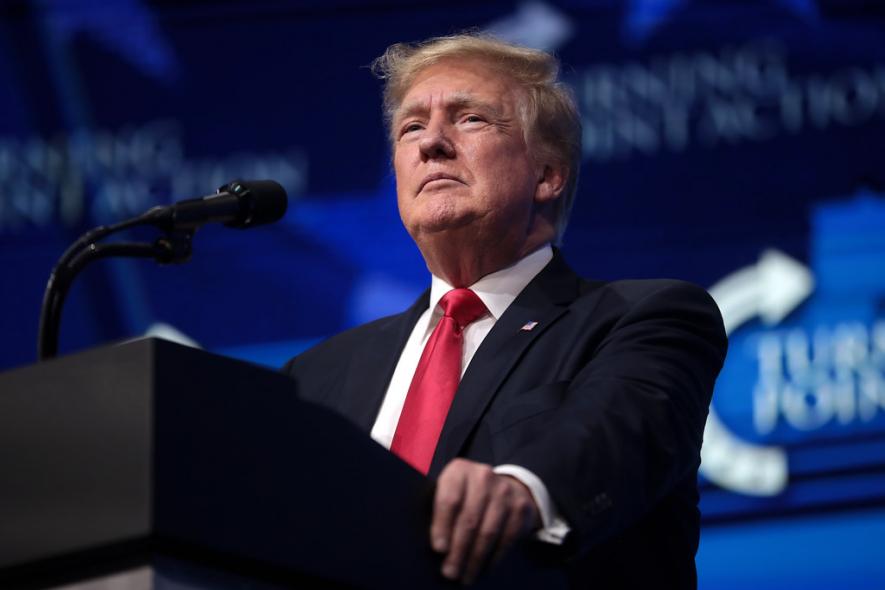Trump Stored Document on Foreign Nation’s Nuke Capability at Resort

Donald Trump. Image Courtesy:Flickr
A bombshell leak from the United States (US) Department of Justice (DoJ) has revealed that one of the 300-plus classified documents seized by the Federal Bureau of Investigation (FBI) during the August 8 raid at former President Donald J Trump’s Mar-a-Lago resort, in Florida, contained information about a foreign country’s nuclear capabilities.
The FBI had recovered more than 300 classified papers during the raid: 184 in a set of 15 boxes that were sent to the National Archives and Records Administration in January, 38 handed over by a Trump lawyer to investigators in June and more than 100 documents in August.
In an exclusive report filed by The Washington Post on Tuesday, a day after a federal Judge authorised the appointment of a special master to review the seized records, sources familiar with the matter said that the document describing the foreign country’s nuclear-defence preparedness was part of the last batch of papers recovered by the FBI.
The sources neither identified the foreign nation nor offered any further details. The DoJ and the FBI declined to comment.
The Post’s Devlin Barrett, who along with Carol D Leonnig, reported the revelation, told CNN that the “most serious category of this type of information is referred to as ‘special access programme’. It is a type of top-secret information—extremely close-hold and tightly held”.
“It is such a sensitive area [nuclear capability). Obviously, when you talk about the nuclear capabilities of foreign military agencies, the US government in no way wants to spread around [that information],” Barrett said about the seized document.
Mentioning the sensitivity of such information, Barrett said one of the court filings stated that “even the investigators who recovered the material—though they were counterintelligence agents—were not authorised to review some of the documents”.
“It was not only the agents, some of the federal prosecutors involved in this matter also did not automatically have a clearance to look at some of these material. That is how close-hold it was,” Barrett added.
Former director of National Intelligence James Clapper found The Post’s revelation “appalling”. In an interview with CNN, he said that “obtaining such information [about a nation’s nuclear capability] is very difficult”.
Fearing whether the US has “lost a sensitive collection capability”, Clapper said, “This has been a concern in general with the revelation of the presence of these documents under not very secure conditions. [Besides] There is the concern about other nations’ willingness to share [information] with us. This is very, very concerning to me assuming the reporting is accurate.”
The Office of the Director of National Intelligence, meanwhile, is conducting a risk assessment to determine how much potential harm was posed by the removal of hundreds of classified documents from the government’s custody.
The Post had previously reported that federal authorities were looking for classified documents about nuclear weapons among the seized papers. Some of the documents require special clearances ‘on a need-to-know-basis’ and even some of the most senior national security officials of the Joe Biden administration are not authorised to review them.
People familiar with the search told The Post requesting anonymity that some of the seized documents are about top-secret US operations with many senior national security officials unaware of them. Only the president and some of his Cabinet members can authorise other officials to know details of these special programmes. Such records are secured under lock and key with a designated control officer keeping careful tabs on their location.
Decrying the leak, one of Trump’s lawyers Christopher Kise said that there is “no respect for the process nor any regard for the real truth. This does not serve well the interests of justice”.
“Moreover, the damage to public confidence in the integrity of the system simply cannot be underestimated. The responsible course of action here would be for someone—anyone—in the government to exercise leadership and control,” Kise further said.
After the court “provided a sensible path forward which does not include the selective leak of unverifiable and misleading information”, Kise said that “there is no reason to deviate from that path if the goal is, as it should be, to find a rational solution to document storage issues, which have needlessly spiralled out of control”.
Get the latest reports & analysis with people's perspective on Protests, movements & deep analytical videos, discussions of the current affairs in your Telegram app. Subscribe to NewsClick's Telegram channel & get Real-Time updates on stories, as they get published on our website.
























